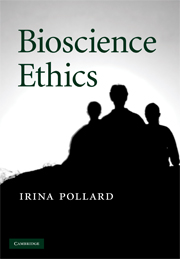Book contents
- Frontmatter
- Contents
- Preface
- Acknowledgements
- 1 Human origins, natural selection and the evolution of ethics
- 2 Sex determination, brain sex and sexual behaviour
- 3 Inappropriate lifestyle and congenital disability in children: basic principles of growth, toxicology, teratogenesis and mutagenesis
- 4 Substance abuse and parenthood: biological mechanisms – bioethical responsibilities
- 5 Fertility awareness: the ovulatory method of birth control, ageing gametes and congenital malformation in children
- 6 Understanding child abuse and its biological consequences
- 7 The state of wellbeing: basic principles, coping strategies and individual mastery
- 8 The state of wellbeing: on the end-of-life care and euthanasia
- 9 Current reproductive technologies: achievements and desired goals
- 10 The recombinant DNA technologies
- 11 Stem cells, nuclear transfer and cloning technology
- 12 Human-dominated ecosystems: re-evaluating environmental priorities
- 13 Human-dominated ecosystems: reclaiming the future for following generations
- 14 Human-dominated ecosystems: warfare = fitness enhancement or losing strategy?
- 15 Human-dominated ecosystems: reworking bioethical frontiers
- Further reading
- Index
7 - The state of wellbeing: basic principles, coping strategies and individual mastery
Published online by Cambridge University Press: 17 February 2010
- Frontmatter
- Contents
- Preface
- Acknowledgements
- 1 Human origins, natural selection and the evolution of ethics
- 2 Sex determination, brain sex and sexual behaviour
- 3 Inappropriate lifestyle and congenital disability in children: basic principles of growth, toxicology, teratogenesis and mutagenesis
- 4 Substance abuse and parenthood: biological mechanisms – bioethical responsibilities
- 5 Fertility awareness: the ovulatory method of birth control, ageing gametes and congenital malformation in children
- 6 Understanding child abuse and its biological consequences
- 7 The state of wellbeing: basic principles, coping strategies and individual mastery
- 8 The state of wellbeing: on the end-of-life care and euthanasia
- 9 Current reproductive technologies: achievements and desired goals
- 10 The recombinant DNA technologies
- 11 Stem cells, nuclear transfer and cloning technology
- 12 Human-dominated ecosystems: re-evaluating environmental priorities
- 13 Human-dominated ecosystems: reclaiming the future for following generations
- 14 Human-dominated ecosystems: warfare = fitness enhancement or losing strategy?
- 15 Human-dominated ecosystems: reworking bioethical frontiers
- Further reading
- Index
Summary
A life course approach says that the management of adult chronic disease cannot be separated from the management of women in pregnancy and children.
Modern technological advances have offered humans, especially those living in industrialized communities, innumerable opportunities to enjoy a more comfortable, healthier and proficient lifestyle. The rapid expansion of scientific knowledge and medical skills has provided options that could not have been anticipated by those living one or two generations ago. This newfound knowledge has, in general, reinvigorated interest in ‘the meaning of life’ issues and stimulated vigorous debates, ranging from right-to-procreation to right-to-die concerns. Unfortunately, our unprecedented medical successes and ‘wonder’ cures have effectively encouraged health service providers in the belief that, given time, science will successfully meet all health challenges. In turn, this attitude has generated a mental passivity or confidence that biomedical technology can, indeed, take care of all our health problems. As we enjoy the advantages of the modern biomedical revolution, it is opportune to reassess modern and ancient insights with a view to integrating the essentials of healing and wellbeing. In biological terms, health and ill health are not alternative states; rather they are part of the same continuum. This concept is well expressed in an old Filipino saying: ‘Ang sakit ng kalingkingan ay sakit ng buong katawan’ or ‘a pain in the little finger is something the whole body suffers’ (Leonardo Castro, personal communication). Traditional wisdom, as in the quote above, is also supported by a rapidly growing research-based literature, particularly that of stress physiology.
- Type
- Chapter
- Information
- Bioscience Ethics , pp. 124 - 134Publisher: Cambridge University PressPrint publication year: 2009



